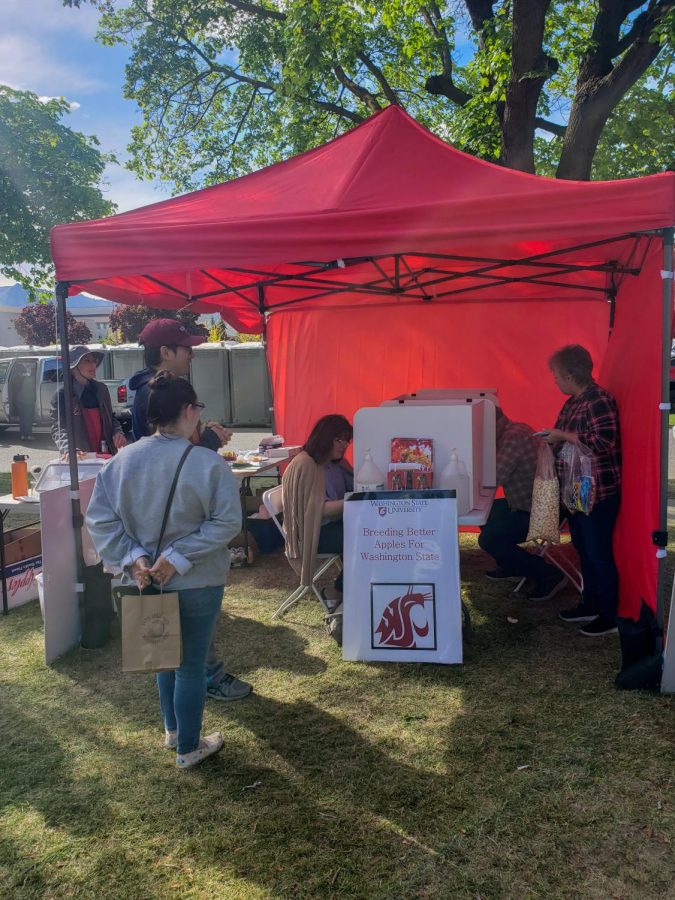WSU breeding program creates new apple
New apple is a mix between Pink Lady and Honeycrisp, is set to hit stores in six years
Public tasting event at the Wenatchee Apple Blossom Festival in 2022
June 8, 2023
WSU’s Tree Fruit Research and Extension Center is breeding a new type of apple, which is looking to be on store shelves within the next few years.
Horticulture department professor Katherine Evans said WSU has an apple breeding program that started in 1994. The latest apple is a product of planned plant breeding, as well as some evaluation and selection.
Jeremy Tamsen, College of Agricultural, Human and Natural Resource Sciences Innovation and Commercialization director, said every time an apple plant is pollinated, a sexual cross is produced.
“What they do in a breeding program like ours … [is] manually, they take trees of two kinds that they want to cross, so in this case, they took trees of Pink Lady and trees of Honeycrisp, and they planted them next to each other and allowed them to cross-pollinate,” he said.
A different apple is produced each time this takes place, Tamsen said. Two apples might be from the same family, but a different apple is produced every time pollen is crossed, and each of those individual crosses has different traits.
After the trees are pollinated and grow, breeders take the fruit from the trees and plant their seeds, which continues the pollination process, Tamsen said.
Over the years, there are multiple different sexual crosses created when the plants and trees are pollinated and become fruit and produce trees, he said.
“They grow those up into trees and harvest the apples from those trees to see if … they successfully crossed the desirable characteristics from each of the two parents,” Tamsen said.
This process takes a long time, so the resources from the Washington Tree Fruit Research Commission and other organizations put into the program go toward paying for the long duration of testing, observing and caring for the plants, he said.
Tamsen said the fun part of this process is doing taste tests of fresh fruit and making notes of how they taste, how well they were harvested, what they look like, what the texture was like and more.
Evans said the breeding program is based in the Wenatchee area, and the evaluation stages of the program are done in a couple of grower commercial orchards in Central Washington; it will take a couple more years for this specific tree to be planted in a commercial orchard.
The apple has a patented name of WA-64, and it will not be available for another six or seven years, Evans said.
“It will, at some point, have a catchier name than WA-64,” she said. “So by the time it’s in stores, it’s not going [to have] WA-64 on the fruit.”
Tamsen said he hopes to do some sort of competition to name the apple before it hits the shelves to engage with the WSU community and get as many good ideas into the program as possible for the name of the fruit.
In about a month, an announcement will be made about this new apple with the goal of getting as many growers to look at it as possible, he said.
The announcement will consist of introducing the apple and making it known partners are needed to grow the trees and make them available to nurseries so they can sell them to people who are going to grow them at home or an orchard, Tamsen said.
“We want to have a deal done and have stuff coming out of their land by 2025,” he said. “Growers will have the opportunity to hopefully be purchasing trees to commercially install in their orchards.”
Evans said any product that comes out of the plant breeding program and has been evaluated and seen to have good enough quality to be released is an achievement.
“There are a lot of apples in the marketplace right now, we know that a lot of them have been around for quite a long time,” she said. “It’s my job and the breeding program’s job to improve the portfolio of varieties that are out there for consumers.”
















